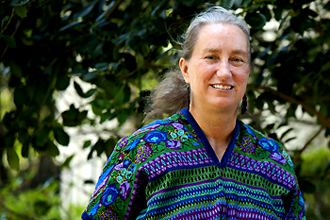She"s Like, "Language Is So Cool"
One of the truisms of linguistics is that if people need their language to perform in certain ways, they will find ways to make it happen. Judith Maxwell, professor of anthropology and director of the Interdisciplinary Program in Linguistics, says she is fascinated with such innovation. “I am interested in the way things move through the language,” she says.

Judith Maxwell, professor of anthropology and director of the Interdisciplinary Program in Linguistics, is fascinated by the way language lives and changes. (Photo by Paula Burch-Celentano)
An innovation she's particularly fond of is one that in the last 50 years has become rooted in the way English is spoken. It's what she calls the quotative (spoken with quotation marks) use of the word “like.” That's when a speaker uses “like” in a way that licenses a dramatic interpretation of someone else's actions.
For instance, in describing a recent encounter on the street your friend says: “This guy comes up to me and is like [at this point your friend begins to imitate the other person], 'Hey man, where'd you get those tennis shoes?'”
“It's actually a little more performative than quotative,” says Maxwell, “because you are not just saying what they said; you are 'doing' what they said. You have your hands on your hips or roll your eyes or toss your hair.”
Such innovations are not required by grammar, but they “allow for artistry,” says Maxwell. “If you look at them as part of verbal art, then they have pretty serious discourse functions because speakers are always trying to focus the hearer's attention on what they think is important.”
Another artistic adaptation of the word “like” is as a device to focus attention on the next thing said. “He was, like, so upset,” Maxwell offers as an example. “It can be used to intensify, or it can be sarcastic or ironic.”
Both uses of “like” are indications to the listener that he or she is going to have to take a more active role in order to understand what's being communicated. “It's a signal that you are going to have to do some mental work,” says Maxwell.
